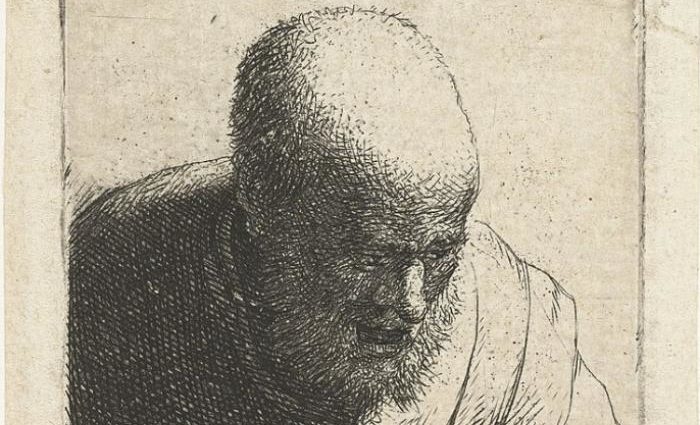Alvin Goins was a day laborer living in Rhea County, Tennessee, during the early and mid-years of the twentieth century. He was a Melungeon, a descendant of Portuguese ancestry. He was also illiterate. Yet, he had an extraordinary gift for numbers, able to calculate sums mentally in seconds, qualifying him, in the parlance of the day, as an “idiot savant.” His special trick was telling a person how old he or she was in months, weeks, days, and hours given the person’s birthday. I met him once, but the experience left an indelible impression on the boy I was.
In the years following, I came to understand that Alvin was a priest of the woods and orchards. Here is my tribute to him.
Alvin Goins
An old man, hatless, cups a crow’s call
to his ear, culls patiently the false peeps
of night. Tomorrow he would pray
for strong feet to carry him
beyond the gored ridge where
blackberries tangle and run.
There he salts his day
under the sun, picks shade
with care, begs no one’s
understanding. In second, silent
consideration he whittles away
the landscape.
Soon
cars roll up in dust, windows flash
in a mirror of unrecognizable
faces. Perhaps a voice comes
to scatter his remains.
Instinctively he crouches, bends
like a shadow, his back
a question mark against
all that light.
Safety lies in a name calling
his own, to which
he now draws closer.
A man, quick to identify
himself as a boy
Alvin once knew points
to a face
behind freckles:
“Alvin, this is my son.”
With a candor from which he
will soon grow aloof, the boy
swallows the apple in his throat,
gapes at the enormous head
framed in white.
“Alvin, I told him how you
could cipher, how you could count
a man down from the day
he was born.”
By such a trick
the old man has countless
times bought a piece
of his life, sweated and grinned
that those grown dangerous
wanted little more
of him.
Now the boy will learn
that a man has so many
digits, like days, to subtract
from the rest of
his life.
“Now, let’s see, when
Were you born?”
“February 17th, 1943.”
But already the old man knows
the answer, has it
lodged in his head. It is up
to the boy to find
how short are the ways
of his passing here, or failing that,
how there is no
such thing as a chance
encounter.
The boy listens, watches
beyond years as the old
man, counted a fool
for the duration of everyone’s
memory, supplies the remainder
of all a ten-year-old
has yet to lose.
“Now, let’s see. You’ve been on
this earth 3740 days. That’s
99763 hours.”
Lost in dateless thought
the boy disremembers himself
as he was, discovers to
uncertain advantage the perishable
appetite of words.
“How did you do that!”
Quickly he tucks himself
under his father’s arm, peers
up at the shadowed face
glistening like a demon’s. His
father, inclined to the old man’s
purposes, grins as one never seen
before. Horizons shift, and a
boy’s certain footing becomes
a blear and blinding blackness,
his only direction. Blinking
he awakens to laughter
of himself grown suddenly
distant.
“Why, honey, there’s nothing
to it. You come live
with me for six months
and I’ll teach you to count
like that.”
Stray hand scuffs knee
as the boy shrinks from
shadow-threatening day. In
mock debate his fate is
decided, sealed from once
familiar view by one
whose face escapes focus
in heartdance anticipation.
“No, Alvin, I guess I’d better
keep him with me. I might
get lonely without him.”
The old man grins flawlessly,
tips invisible hat, uproots feet
once more. With the blood juice
of berries staining hands
overgrown and contagious for
weeds, the old man
departs, his harvest wages gathered
in the first fruits of a day
dreamed in dust.
Now the boy sits a man,
panting after memory of one
whose shallow remains untroubled
the crumbling earth. His dogtrot
paths, grown up now, lay buried
like a secret at his feet.
All that are left are his tale
and its telling – given to a boy
by degrees grown accustomed
to remote places and misdirected
ways.
Carefully he uncovers the decaying years, seeks to trace
some traceless loss taken
root in the pulse of his fingers.
A child blooms unencumbered,
pillowed in the shadow-lace of
clouds escaped from lingering
notice. To an old man’s lip
music he awakens caressed
by a coverlid dance of beams.
Hipped in berries they recall
forsaken paths, crouch in the
ragged shadow of a crow
overhead. Tomorrow they would pray
for tireless feet to carry them
beyond the far-flung fields
where overcast and trodden seeds
of time remain unnumbered.
**Featured Image Source: Bust van een kale man – Rembrandt van Rijn, 1628-1631/ Rijks Museum, Amsterdam




Eddie, both sides of my family were from Graysville. As a youngster we were up there pretty much every Sunday. I can’t tell you how many times my Dad would stop the car and talk to Alvin. He had known Alvin since he was a kid. Alvin was almost always sitting by the side of the road whittling. Always a smile.Dad would always throw math problems at him. He never hesitated on a one. Your poem took me back as if I were there yesterday. Thank you so much.
So glad you enjoyed, Steve. I left a note on your FB page.
My sons especially would have loved that man. I wonder if anyone ever taught Mr. Alvin to play chess?